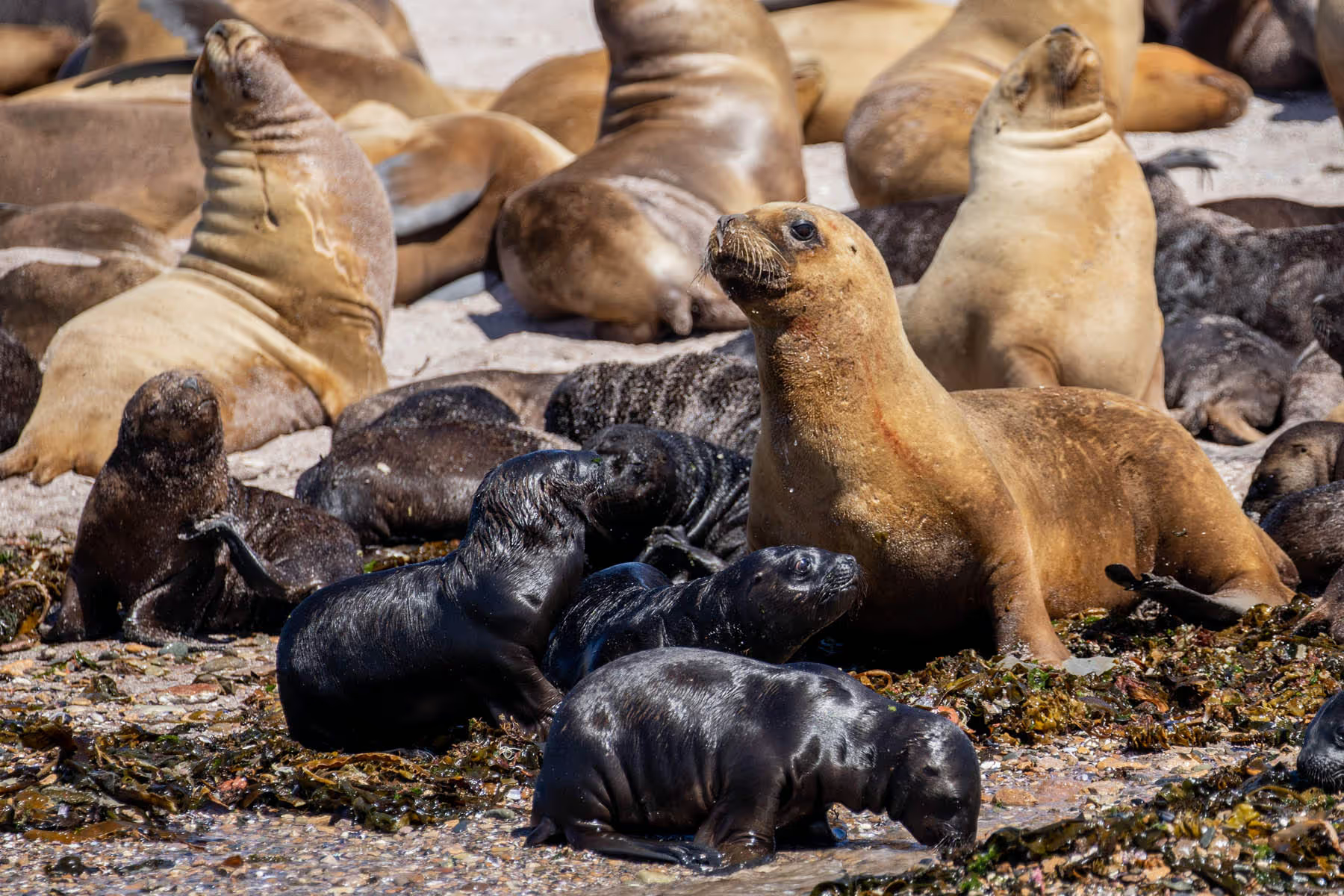
Bahía Bustamante Lodge is a Patagonian ranch surrounded by 360° of pure nature. On the coast, only a few places in the world boast such an abundance and diversity of marine birds and mammals. Our purpose is to preserve the natural environment with a sustainable project.
Bahia Bustamante is a family property, a Lodge within a wildlife sanctuary. Our main objective is to protect this paradise, and share the incredible nature that surrounds it, promoting conservation and raising awareness about the need to care for this fragile ecosystem.

A family of Steamer Ducks (Tachyeres pteneres)
Since 2008, the coast of Bahia Bustamante has been part of the first National Marine Park in Argentina. We actively participated in the creation of this new National Park, promoting and working alongside the state to achieve the results.
Since 2015, Bahia Bustamante is also part of the UNESCO “Blue Patagonia” Biosphere Reserve, one of the largest reserves in Argentina, protecting the greatest biodiversity on the coast of our country. Inland, we do regenerative sheep production to restore the Patagonian grassland.
A Guanaco (Lama glama guanicoe) in the Steppe


An outstanding number of 13 of the 16 species of seabirds that nest in Argentina, do so in Bahía Bustamante
They are divided into 21 breeding colonies composed of 1 to 7 species each. Among the species is the Magellanic Penguin colony (spheniscus magellanicus).The area also houses large colonies of Royal Cormorants (phalacrocorax atriceps), the largest producer of guano in the country, and Black-necked Cormorant (P. magallenicus).

Two endemic species
The Steamer Duck (Tachyeres leucocephalus) and Olrog's SeaGull (Larus atlanticus) can be seen in large concentrations. These species are considered endangered worldwide.





Also frequent in the area: 7 migratory, 5 Nearctic and 2 Patagonian species
The Bahia Bustamante region is one of the most visited spots by seabirds during the migration season, especially by the Red Sandpiper (Calidris canutus), the White-rumped Sandpiper (Calidris fuscicollis) and the Sea Woodcock (Limosa haemastica) which have their main non-reproductive colony in Tierra del Fuego.
Great variety and diversity of other sea and steppe birds
There is a colony of Sea Lions (Otaria Flavescens) of 4,000 individuals. This is a very large colony, representing 20% of all sea lions that inhabit the San Jorge Gulf.
The wealth of fauna also attracts orcas and dolphins. On occasion, it is also possible to observe a Southern Right Whale or Elephant Seal, which arrive from the Valdés Peninsula.
As for the steppe fauna, you can often see maras, foxes, choiques and guanacos. It is also possible to come across some furry animals, like skunks and also tinamous.



Solar Energy
We use solar energy to generate electricity (we produce 24 kw). We have a backup electric generator.
Hot Water
60% of the hot water we use is generated through solar energy.
Spring Water
We use natural spring water throughout the Lodge. We provide our guests with reusable bottles for activities.
Organic Waste
We grow our food and use the Lodge's organic waste to produce compost.
Recycling
We separate the garbage. The plastic and cardboard are taken to the city, for sale and recycling.
Amenities
Our amenities are organic. To avoid unnecessary use of plastic, we use dispensers that we refill.
Holistic Management
We apply Holistic Management in the wool activity, with the aim of restoring the grasslands of Patagonia and we use solar energy in the fields.
Plantation
We planted more than 1000 trees, to provide us with shade and firewood and to serve as a barrier against the wind.
Irrigation
We re-use water for irrigation.
Balance
We guarantee the balance between nature and human presence by limiting the maximum capacity of the Lodge to 30-35 guests per day.
Local Workforce
We prioritize sourcing local workforce.
Nature
We share our love for nature and sustainable living with our guests, seeking to raise awareness and promote simple living, in close contact with nature.
Research
We collaborate with biologists and other scientists by offering the property as a base of operations for their work. From the conception of the hotel project we are aware of the biological importance of the area and we consult experts for help. Today our actions in favor of environmental conservation focus on working with research teams from different organizations and institutions (CONICET, National University of Southern Patagonia, Wildlife Conservation Society, Fundación Patagonia Natural, among others).
Coming Soon

Biologists at work